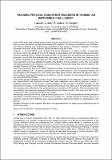Training Physical Education teachers in Tunisia: An impossible challenge?

Editeur(s) scientifique(s)
Gómez Chova, LuisLópez Martínez, Alejandro
Candel Torres, Ignacio
Type de référence
Date
2021Langue de la référence
AnglaisEntité(s) de recherche
Laboratoire sur les Vulnérabilités et l’Innovation dans le Sport (EA 7428)Résumé
In the 1960s sport was considered as a mean of youth education by the political power of Tunisia. This led to develop the training of physical education (PE) teachers, PE being conceived as a sport initiation. The training duration was progressively increased to four years in “Superior Institutes of Physical Education and Sport” (local acronym: ISSEP) created during the 1990s. However, in the mid-2000s, such dynamic had to be changed in a difficult context. A three-year curriculum had to be designed to put PE training in accordance with the Bachelor-Master-Doctorate structure adopted by the Tunisian University in 2005. In the same time the training was impacted by the Education Law of 2008 that attributed new objectives to PE. In addition, since this time, there has been no longer possibility to be recruited as a PE teacher within five years after the end of the training. These elements may have affected the staffs of the ISSEPs and the students, which may have limited the training adaptation, its relevance, and/or its efficiency. The present study thus aimed to examine this possible influence on these subjects. This study involved a total of 34 ISSEP subjects including: the directors of the four existing institutes (D), eight academics (A), 12 trainers specialized in sport technology (T), and 10 graduate students not yet recruited as PE teachers (S). Semi direct interviews were done to determine the points of view of these subjects regarding the training and its efficacy. This led to realize a textual analysis of the verbatim (by using Alceste2012Plus©). This textual analysis identified 105.407 lexical forms distributed in six categories. Content analysis of the representative text fragments showed that these categories were used to point-up a series of problems regarding: (1) the courses in sport pedagogy, (2) the courses in scientific domains,(3) the internships in schools, (4) the learning of professional skills,(5) the follow-up of the graduated, and the socioeconomic difficulties of the graduated not yet recruited as PE teachers. The interviewees were associated to the respective categories of lexical forms as follows: D with (3) (4), and (5), A with (2), (3), (4) and (5), T with (1) and (6), S with (1), (2) and (6). Interestingly it was found that the subjects of each group (D, A, T, or S) only pointed-up training problems imputable to external causes or by invoking such causes (i.e., causes imputed to another group or to elements external to the ISSEPs). Such causal attributions might thus hamper an optimization of the training. Possible influence of the subjects’ affectivity and representations on these causal attributions will be further discussed.Titre de l’ouvrage principal
INTED21 ProceedingsMaison d’édition
IATED AcademyVille d’édition
ValenciaPays d'édition
SpainISBN
978-84-09-27666-0Evaluation par les pairs (peer reviewing)
ouiPortée nationale / internationale
internationalePagination
7236-7245Public(s) cible(s)
Chercheursprofessionels du domaine
Etudiants
URL permanente ORFEE
http://hdl.handle.net/20.500.12162/4966Autre(s) URL(s) permanente(s)
http://doi.org/10.21125/inted.2021.1444La publication existe uniquement sous forme électronique
ouiDocument(s) associé(s) à la référence
Texte intégral :
Fichier
Accès
Commentaire
Version
Taille
- Tout ORFEE
- Détail référence



